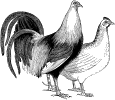A fowl canard.
Dear Word Detective: Do you know the origin of the name “chicken pox” in reference to the virus? Why chicken? — Chris Smith.
That’s a darn good question. Why chickens, indeed? I think it’s high time to put an end to the linguistic abuse of the noble chicken, a humble creature whose only ambition is to float lazily in a bowl with some noodles. It’s a scientific fact that not only do chickens not spread “chicken pox,” but they themselves are immune to the disease. But no, when something unfortunate happens or we notice the less attractive aspects of our own nature, we pin it all on the poor chicken, the Rodney Dangerfield of the animal world. We call those without courage “chicken-hearted” or “chicken-livered,” or speak of them “chickening out,” especially when challenged in a dangerous game of “chicken.” We deride small amounts of money as “chicken feed” and declare those past their prime as “no spring chicken,” but you’ll notice that no one seeks the positive form of the metaphor (“quite the spring chicken”).
the linguistic abuse of the noble chicken, a humble creature whose only ambition is to float lazily in a bowl with some noodles. It’s a scientific fact that not only do chickens not spread “chicken pox,” but they themselves are immune to the disease. But no, when something unfortunate happens or we notice the less attractive aspects of our own nature, we pin it all on the poor chicken, the Rodney Dangerfield of the animal world. We call those without courage “chicken-hearted” or “chicken-livered,” or speak of them “chickening out,” especially when challenged in a dangerous game of “chicken.” We deride small amounts of money as “chicken feed” and declare those past their prime as “no spring chicken,” but you’ll notice that no one seeks the positive form of the metaphor (“quite the spring chicken”).
Chickens get no respect either coming or going. Chickens are criticized for having “flown the coop,” but on returning find that “the chickens have come home to roost” is a popular way of saying that someone is getting a deserved punishment. It’s no wonder we’re advised not to “count our chickens before they’re hatched.” There’s not much of a sunnyside up to being a chicken.
A “chicken” is (for all you vegans living in caves, I suppose) a domestic fowl of the species Gallus gallus. The word “chicken” comes from the Old English “cicen,” which originally meant only “young fowl.” There’s a fairly developed chicken nomenclature (capon, pullet, hen, rooster, etc.), but for our purposes we’ll just imagine a generic chicken.
“Chicken pox,” which, to reiterate, has nothing to do with chickens, is a virus more precisely known as Varicella zoster, a member of the herpes family. Chicken pox is a very common childhood disease that produces itchy bumps (“pocks” or “pox”) on the skin and can be very unpleasant for a week or two. But while chicken pox can produce serious complications in adults (especially pregnant women), most cases resolve themselves fairly quickly and thereafter confer lifelong immunity to the disease.
The relative mildness of chicken pox is striking in contrast to another “pox” disease, smallpox, probably the deadliest disease in human history before it was eradicated (at least “in the wild”) in the 1970s. This contrast probably explains the name “chicken pox,” which connotes mildness and safety as opposed to the virulence of smallpox. It has also been suggested that “chicken” in the name refers to a supposed resemblance of the pox to chickpeas, or that the skin of a sufferer looks as if it has been pecked by chickens. But the “not dangerous” sense of “chicken” is the most likely source, especially given that chicken pox was for many centuries considered an innocuous form of the deadly smallpox.




Cool, this site is a great find!
Reasonable explanation………
Thanks, this site has been a great find!
Very reaonable explanation
Chicken pox is one hell of a nasty disease, it ruined my flawless skin a couple of years ago.;.,
Chicken pox is one hell of a nasty disease, it ruined my flawless skin a couple of years ago.:..
“The word chicken pox came from an English word “gican” which meant “Itching” or a French word “chiche-pois” meaning chicks pea which described the size of lesions which were similar to the size of the seeds.”
from http://www.chickenpoxsymptoms.info/chicken-pox-origin/
a little bit of extra info…
Chicken Pox can cause massive scarring of the skin that may not clear, that’s bad’*”
Chicken pox even after it is over can still leave behind a nasty problem, which can surface in later years in some people as Shingles. I know this to my cost.
there are three pox diseases :
1. Great pox – (bacterial)refers to secondary syphilis
2. Small pox – (RNA virus)severe form, now eradicated
3. Chicken pox – (DNA virus)not very deadly
After the “Columbian exchange”, great pox was spreading across Europe and the small pox was devastating the Americas. Syphilis was controlled with discovery of antibiotics… and the small pox was eradicated with the help of an effective vaccine… and chicken pox can never be eradicated because it is a DNA virus (integrates into the genome of man.
Both chickpea and gican/itching appear convincing etymologies… THANX
Small Correction: While chicken pox is a herpesvirus like mentioned earlier, but it is not under the poxvirus or related to “small pox”, only called that because of the pox marks chicken pox makes
So chickenpox has nothing to do with the bird causing the desease? Good to hear, Todah-Thanks